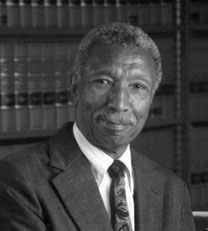Robert Lee Carter (1917–2012), a federal district court judge in New York and one of the great lawyers of the civil rights movement, successfully argued numerous cases before the Supreme Court, including part of the historic group of school segregation cases known collectively as Brown v. Board of Education (1954).
Carter argued First Amendment cases before Supreme Court during Civil Rights era
In his distinguished career, Carter presented at least six First Amendment cases before the high court during the Civil Rights era, including NAACP v. Alabama (1958); Bates v. Little Rock (1960); Shelton v. Tucker (1960); Louisiana ex. rel. Gremillion v. NAACP (1961); Gibson v. Florida Legislative Investigation Committee (1963); and NAACP v. Button (1963).
A native of Careyville, Florida, Carter obtained his undergraduate degree from Lincoln University, in Pennsylvania, in 1937. He went on to earn a law degree from Howard University in 1940 and a master of laws from Columbia Law School in 1941 before serving in the army in World War II.
Carter began his career at the NAACP Legal Defense and Education Fund, where he served under Thurgood Marshall. He eventually succeeded Marshall as the group’s general counsel, serving in that capacity until 1968.
Carter worked for a few years in private practice before President Richard M. Nixon nominated him to become a federal district court judge for the Southern District of New York in 1972. He took senior status in 1986.
David L. Hudson, Jr. is a law professor at Belmont who publishes widely on First Amendment topics. He is the author of a 12-lecture audio course on the First Amendment entitled Freedom of Speech: Understanding the First Amendment (Now You Know Media, 2018). He also is the author of many First Amendment books, including The First Amendment: Freedom of Speech (Thomson Reuters, 2012) and Freedom of Speech: Documents Decoded (ABC-CLIO, 2017). This article was originally published in 2009.

